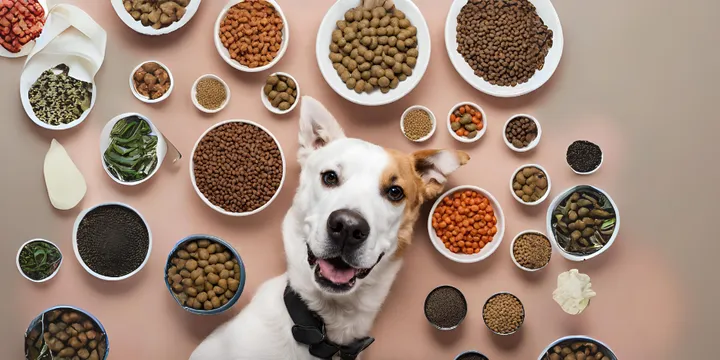
What Should You Feed Your Dog?

Dogs are fantastic friends, but when it comes to choosing their food, it can be a little confusing. "What should I feed my dog?" is a question many dog owners ask themselves. Let's explore this topic and find the answers.
How History Has Shaped Your Dog's Diet
Dogs have been our faithful companions for centuries, but have you ever wondered how their diet has changed over time?
The history of your dog's diet is intertwined with a long and fascinating history dating back thousands of years.
Let's take a closer look at how history has influenced what you should feed your furry friend.
Dogs and their Wild Roots
Your modern dog has a wild ancestor: the wolf. This connection goes back in time, somewhere between 15,000 and 40,000 years ago.
Amazingly, dogs share more than 99% of their DNA with these wild wolves. This common ancestry explains a lot about your dog's dietary needs.
In the wild, canines were skilled hunters and relied on the internal organs of their prey as their main source of nutrition.
Organs such as the liver, kidneys, heart, spleen and brain were full of essential nutrients that kept them strong and healthy.
They also consumed other parts of their prey, such as fur, skin and even eyes.
Bone Strength and Immunity
The bones of their prey provided a natural source of calcium and phosphorus, which are crucial for maintaining healthy teeth and bones.
The dogs also benefited from the zinc found in the bones, strengthening their immune system.
In addition, the omega-3 essential fatty acids in their diet helped reduce inflammation, keeping them in excellent health.
Adding Variety
The dogs didn't stop at organs and bones. To add variety and obtain nutrients not found only in meat, they also consumed herbs, fruits and vegetables found in their natural environment.
This diversity in their diet ensured that they got all the essential nutrients they needed to thrive.
Evolution and Dietary Changes
As dogs evolved from their wild ancestors into the loyal and loving companions we know today, their diet began to change.
Domestication brought dogs closer to humans, and they became more dependent on us for their food.
Despite these changes, one thing remains constant: the basis of a dog's diet should remain similar to its wild roots.
A high protein and fat content from meat should be the core of their diet, with carbohydrates from fruits, vegetables and plant material kept to a minimum.
How have dog diets changed?
Dog diets have undergone transformations over time as they evolved from wild hunters to our loyal companions.
In the past, dogs relied on a diet rich in animal proteins and fats, with a focus on the internal organs of their prey, such as the liver, kidneys and heart.
These organs were packed with essential nutrients such as vitamins A, D, E and K.
The dogs also consumed the lining of their prey's digestive system, which provided them with natural microorganisms, prebiotics and probiotics.
In addition to meat, they ate bones for calcium and phosphorus, as well as skin, fur and even grasses, fruits and vegetables when available for additional nutrients.
However, with domestication and their approach to humans, their diets diversified, including various food scraps.
Despite these changes, the basis of a dog's diet should still prioritize a high content of animal proteins and fats, and limit carbohydrates, thus keeping its diet closely related to its ancestral roots.
Carbohydrates: good or bad?
Carbohydrates, which include sugars, starches and fibers found in fruits, vegetables, bread, grains and sugary foods, play a crucial role in the discussion of dog diets.
Many dog foods on the market use carbohydrates as an inexpensive source of calories, making them common in pet foods.
However, the optimal level of carbohydrate in a dog's daily diet remains a matter of debate.
Research indicates that domesticated dogs have a better ability to digest and absorb carbohydrates compared to their wild ancestors.
However, it is essential to understand that not all dogs process starch in the same way.
Carbohydrates are also converted to sugars, but pet food labels generally do not disclose their carbohydrate or sugar levels.
Excessive sugar consumption in a dog's diet can affect its health and behavior, similar to the effects of excess sugar in our own diet.
Seeking professional advice can be valuable if you are unsure about the carbohydrate content of your dog's food.
Dogs don't eat like us
While we humans enjoy a wide range of tastes, dogs experience the world primarily through their sense of smell.
In fact, dogs have fewer taste buds than humans, which makes their sense of smell crucial in deciding what to eat.
This means that a dog's food preferences are strongly influenced by how something smells, rather than how it tastes to us.
Therefore, maintaining a consistent type of diet and ingredients is vital for our furry friends.
Introducing changes too quickly can lead to digestive problems.
So, when it comes to your dog's diet, remember that it's a whole different world of tastes and smells for them.
Can I mix kibble with raw or wet food?
Many dog owners wonder if they can mix kibble with raw or wet food for their pets.
While this is a common practice, it is important to consider the effects on your faithful friend's health.
Combining these different types of food can affect the balance of bacteria in the digestive system and acidity levels in the stomach.
To ensure a smooth transition, it is recommended to introduce raw food gradually to allow your dog's body to adapt.
Adding high-quality lean meat and organ meats, along with vegetables to a kibble mix of low nutritional value, can be beneficial.
However, it is essential to maintain a balanced diet when combining different types of dog foods.
Be sure to consult your veterinarian for guidance and to make informed decisions about feeding your pet.
Inexpensive vs. premium dog food
Is it better to choose cheap or premium food for your furry friend? This is a common dilemma for dog owners.
The quality and quantity of ingredients, as well as nutritional value, are more critical factors to consider than the price tag.
Cheaper dog foods may use lower quality ingredients and often contain a higher proportion of carbohydrates, resulting in larger portions and potential weight problems.
On the other hand, high-quality dog food can result in improved skin, coat, behavior, smaller stools and overall health for your dog.
It is essential to choose a dog food that meets your pet's specific needs and consult with pet specialty stores for guidance on products and brands that fit your budget.
Remember that the right choice for your dog's diet goes beyond price and should prioritize his health and well-being.
About the Author

Jennifer works as a veterinarian and is an expert in the field of dog care. She is constantly up to date with the latest developments and insights in the world of dog care, and she loves to share her expertise with other dog lovers.









